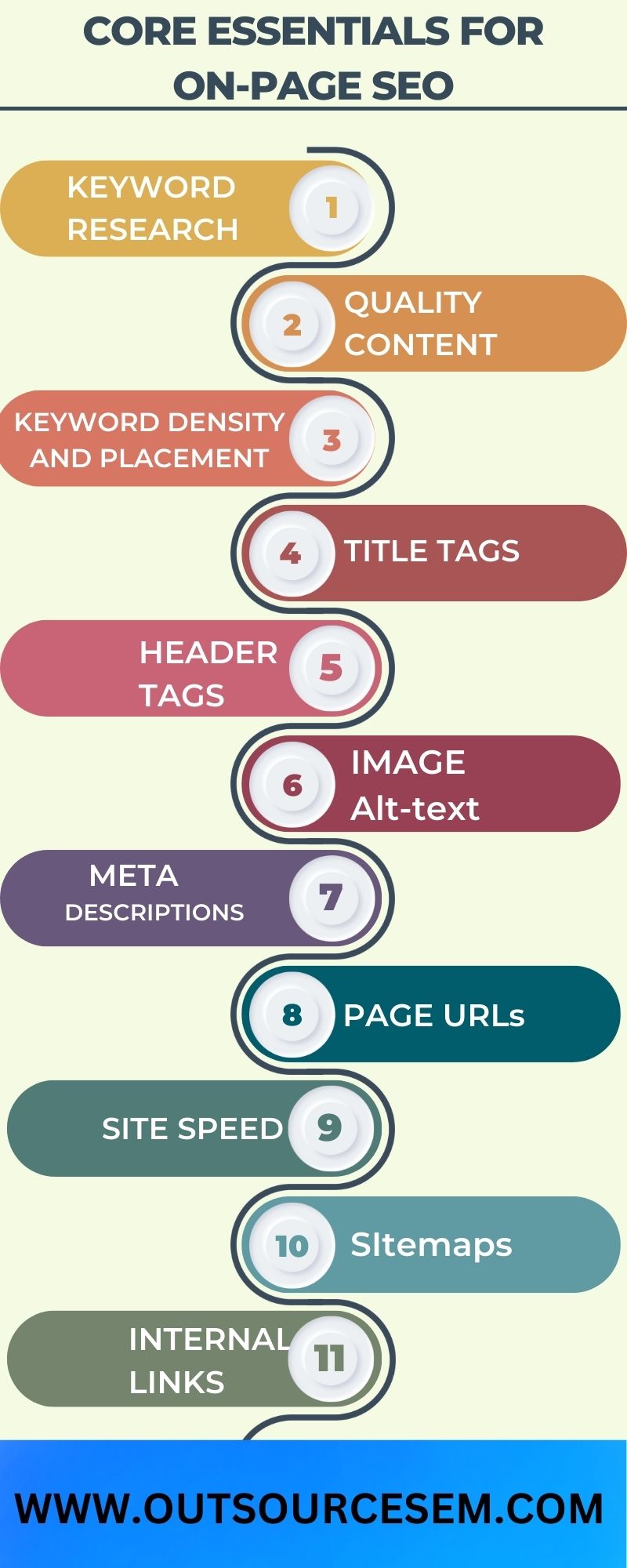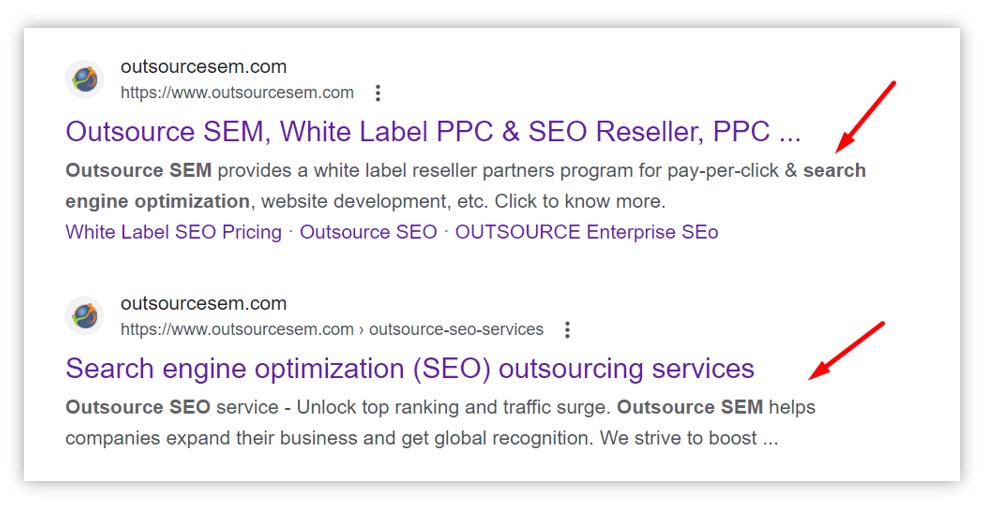In today's digital world, having a professional service-oriented website and a stronger online presence is crucial for businesses to grow. However, just having an online presence is not enough to survive in this high competition. SEO (search engine optimization) helps boost your website rank higher on SERPs and provides you with more traffic and quality leads on your website. Search engine optimization includes on-page SEO & off-page SEO that helps website owners improve their website's performance. With so much competition in online marketing, it's essential to focus on crucial on-page SEO tips, such as conducting keyword research, optimizing content, and much more, to drive organic traffic to your website. In this blog post, we will dive into understanding the most important on-page search factors to consider in a marketing strategy. In this blog, let us discuss how performing these essential on-page SEO tips helps in achieving the desired marketing ROI and effectively optimizing your website to rank it on SERPs.
What is on-page SEO?
Performing on-page SEO is the most crucial factor in enhancing website ranking on search engine result pages (SERPs). By optimizing the elements on our website, such as keyword placements, headlines, HTML tags, alt text images, meta descriptions, etc., we provide search engines with information about what our website is all about. Since most of the on-page SEO elements are under our control, it is vital to use them effectively to increase our website's authority and trustworthiness. Therefore, we must pay great attention to how we perform on-page SEO on our web pages.
Importance of on-page SEO
The importance of on-page SEO lies in the fact that it helps search engines determine the website`s ranking or position on search engine results pages (SERPs) when users search for relevant content. On-page SEO provides search engines with information about your website's content and relevance to user search queries. For instance, popular search engines like Google and Bing rely heavily on SEO signals to rank websites, and they prioritize user experience when doing so. Therefore, when optimizing your website for search engines, make sure that your content is user-friendly and easy for both users and crawlers to understand. Remember that your website's ranking depends on how well you balance user experience and search engine optimization.
On-page SEO vs off-page SEO
Though we use both tactics to improve our site ranking on SERPs, the difference is that in on-page SEO, we do all the optimization on our web pages internally while on our site. Creating quality content, targeting the right keywords, right keyword placement, adding both internal and external links, Alt text the visuals, and optimizing the title tag are some examples of on-page SEO. The best thing about on-page SEO is that all those things are in your hands, and it all depends on your skills and how you optimize them. The off-page SEO is what we do outside our sites to optimize the rank of our site on SERPs. By doing the off-page SEO, we try to convey to the search engines that our sites have more expertise, authority, and trustworthiness (E-A-T). Unlike on-page SEO in off-page, we have very limited control over it. link building, content marketing, GMB listing, guest posting, and local SEO are some examples of off-page SEO.
Understanding on-page SEO
As discussed above, on-page SEO is all about doing all the optimization processes on our site, like choosing the right keywords, keyword placement, adding links to your content, and so on while being on your site. On-page SEO, also known as technical SEO, involves optimizing the backend and technical aspects of a website to improve its crawlability and indexability by search engines like Google and Bing. This helps the website rank higher on search engine results pages. content management system(CMS), site speed, mobile friendliness, robot.txt, XML sitemaps, and structured data markup(“schema”) are some of the elements that we focus on while doing the technical tasks of on-page SEO.
Core essentials for on-page SEO
We know that on-page SEO is optimizing our web pages to make them user and search-engine-friendly, so here are some essential tips and points that can help you guide all the essential steps for effective on-page SEO.

1. Keyword research - Keyword research is the most important part of on-page SEO, as all your work for website ranking depends on how relevant your SEO keywords are to drive website traffic. To conduct keyword research, there are many free and paid tools available online where you can get the search volume and competitor analysis, as well as many more options to choose the best keywords you are looking for. You can also filter those results by location. Google Keyword Planner, Semrush tool, Uber Suggest, and Ahrefs tool are some of the tools you can use for SEO keyword research.
2. Quality content - The first and foremost thing to understand before writing quality content is the user's search intent; yes, if you want to rank higher, you should know what people are looking for and that you are solving their issues with your content. Now, you can move to content ideas; for this, there are tools available like Semrush topic research tool and Ahrefs, etc. You also need to focus on the format and readability of the content. Writing short sentences, adding images, using bullets and number lists, and writing in the right tone give the content uniqueness and needed quality.
3. Keyword density and placement - While writing the content, you must be a little attentive to the keyword density and placement. As per search engine algorithms, you need to target your keywords in the right density and at the right place, as this will lead your site to the top of SERPs. Google and other top search engines respond best when the keyword density is around 0.5%. So, to make your website rank on SERPs, it is advisable that you put approximately 10 keywords per 1000 words on your page, i.e., your keyword density does not exceed more than that; otherwise, it would be counted as keyword stuffing and search engines hate these artificial optimizations of content so, make sure to put keywords naturally.
4. Title tags - Title tags, also known as Page titles, are the most important part of on-page SEO as they tell the visitor and search engine what is the page all about. To make title tags more effective, you can use the focus keyword on each page of the website. For example, if we write outsource email marketing, then it would be written like this.

5. Header tags - Just like printing pages, the Header tags are used for introducing the content below them. The header tags are useful for the readers as well as search engines to give the outline of the content. H1 Tags are used for the most important keyword or content title. H2 and H3 are used for the subheadings and lastly, H4, H5, and H6 are used for the other upcoming subsections.

6. Images alt-text - There are reasons why we optimize all those images on our site pages; the first reason is when users visit the site and any image fails to upload, then those texts will help the viewer to know what the image is all about, and the second and most important reason behind why search engines prefer websites with image alt-text images as it helps the visually impaired people to understand the context to as the reader on search engine read those texts for them. The images alt-text also helps the crawler to index your site smoothly; also, this increases the traffic on your site as they rank on the Google images section.
7. Meta description - While doing on-page SEO writing the meta description is equally important; they are the short descriptions of your page content. While it is not important in terms of page ranking on SERPs, they play a pivotal role in getting traffic to your site. Meta descriptions are visible to the user on search engine result pages below the website's name, help users know what the content is all about, and help increase the clicking rate.

8. Page URLs -Page URLs are the texts that are made to replace the IP address. They consist of a protocol, domain name, and path. A good URL makes the user and search engine understand the landing page better. URLs also play an important role in ranking the website on SERPs when keywords are strategically placed in the URLs.
9. Site speed - Site speed is the most crucial measuring factor search engines use to rank the website on SERPs. The Site Speed depends on what web hosting you are using as well as the page sizes on your site. The size of images, catchy infographics, and videos directly impact the speed of the site. Google Search Console and Semrush site audit are some of the tools that can be used to analyze the site speed.
10. Sitemaps - By adding sitemaps, we tell the search engines which pages, files, and data are important on our site. For example, when the page was last updated or any alternate language versions of the site pages, image location, video running time, blog title, and publication dates are some of the methods of doing the site mapping. If your site is large, you should go for adding the sitemaps, as it will help search engines know even the smallest data on your site.

11. Internal Links - Internal links on your site help the search engine crawl and index it better. Internal linking on your site helps us pass authority to other pages on our site. Internal linking also helps the user on your site to navigate better and find relevant content on the site.
12. Mobile optimization - Mobile optimization is important while doing on-page SEO on the site; by optimizing the site for mobile, we make our site and pages accessible to the users who visit our sites through their mobile devices. Writing meta descriptions, creating titles, and using schema.org structured data are some of the ways of doing mobile optimization.
13. Schema markup - Schema markup does not just give our site a different appearance from others but also impacts the ranking on SERPs as it helps the crawler to understand the content and pages on the site easily. There are different types of schema markup, but search engines like Google only support 35 of them. Local business markup, product markup, and article markup are some examples of it. There are some ways to do schema markup efficiently like:
a. Choosing the right schema type that should match the content type on the site page.
b. It is better to change or update the schema from time to time according to your content.
c. Do not use any irrelevant schema that does not match the content on your site page to rank on SERPs unfairly.
d. Keep yourself updated with the information about schema markup guidelines, which change from time to time.
On-page SEO tools
There are various online search engine optimization tools available to help you do on-page SEO for your site easily without getting into too many technical issues. You just need to know their basic functionality, and you are good to go. If you want to hire SEO professionals, you can also Outsource SEO services and get the work done by experts.
I. Google Keyword Planner - Google Keyword Planner is the most used PPC tool used by PPC specialists but you can also use it to find the keywords with the search volume and the average keyword bidding costs. You can also filter your results with options like a specific location, excluding and including any keyword. It also provides a forecast of how well your keyword will perform in the future.
.png)
II. Google Trends - Google Trends, as its name itself suggests, is a tool by Google that provides data according to search trends over time. There are options available to filter the results by geographic location, topic categories, and time.
III. Google Search Console - Google Search Console is a tool by Google that tells you about your overall site health and provides you the option to monitor how your website is performing on SERPs. Identifying and fixing errors, overviewing search performance, and reviewing the internal and external links on your site are some of the features of Google Search Console.
IV. Google Analytics - If you have your site but not using an advanced tool like Google Analytics, then you are not going to catch your competitors forever. Google Analytics provides your website data by connecting through it. Here, you can track the website traffic, bounce rates, visitor information, and sessions, as well as the goal campaign and activities of your site. The best thing is you can also integrate this tool with other tools like Google Ads, Google Search Console, Google AdSense, etc.
.jpg)
V. Semrush - Semrush is one of the easiest tools for doing on-page SEO. Semrush provides a lot of features that will help improve your site performance on SERPs. Features like SEO, SMM, PPC, keyword research, content marketing, competitive research, and campaign management are available on Semrush, which will help the marketer hone the marketplace.
VI. Google Looker Studio - Google Looker Studio, formally known as Google Data Studio, is a visualization tool that helps us create customizable dashboards and prepare understandable reports; it also helps us to track KPIs, visualize trends, and compare performances over time. One of the best features of Google Data Studio is that it allows the user to connect more than 150 data sources and also makes the sharing and collaboration of reports easy.
.jpg)
On-page SEO checklist
By following this checklist, you can compare whether your on-page SEO task is on the right track or not. Here are some of the points
a. Ensure you are using your targeted keyword in the URL, as this helps search engines to know your page better and can lead to ranking your website on top of SERPs.
b. Unique and plagiarism-free content is most important in an on-page SEO checklist. Writing unique content gives a good impression of your site, and search engines promote unique and user-friendly content.
c. While writing the content, you should always include your keyword in the content body as it gives relevance to the content.
d. Using headers in the content not only helps the search engine crawl your web pages better but is also a user-friendly thing that decreases the bounce rates from your site and pages.
e. Optimizing images and visuals with alt-text is another important thing to do while doing on-page SEO, as it helps provide a better ranking on Google.
f. Adding meta description provides another strength to your site that directly impacts the clicks and traffic on your site.
g. SEO audit is a method to analyze the website performance of search engines as it provides the problems with your website and gives options to fix them.
h. SEO report is another essential process to focus on while going through the on-page SEO as it informs which search engine optimization practices are giving the best results for your site.
i. Adding internal links and external links to your site provides credibility and authority to your site, and search engines like it, too, so make sure to link your site with internal and external links
Conclusion
In conclusion, knowing that on-page SEO is very crucial when it comes to ranking our website on SERPs, doing it the right way, and following the important tactics make us stand out and provide an edge over our competitors. As on-page SEO is done on the pages and almost everything is in our control compared to off-page SEO, it's up to us how we do it the right way. keyword research, unique content, image optimization, title tags, headers, and meta descriptions are some examples of doing on-page SEO. Tools like Google Keyword Planner, Google Ads, Google Analytics, and Semrush are some of the tools that help us do SEO better. After doing search engine optimization, outsource SEO audits and outsource SEO reports are the better and easiest ways to determine whether all your SEO tactics are working or not. If you don't want to stress about doing On-Page SEO by yourself, we recommend giving this task to a professional SEO expert, such as our full-fledged digital marketing agency. Our SEO experts specialize in electrician SEO, flooring SEO, roofing SEO, lawyer SEO, and small business SEO services to improve the ranking of your business website and help your business shine.
References:
. On-page SEO: what it is and how to do it
. The complete guide to on-page SEO
